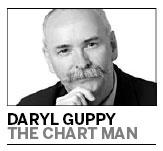Many people believe the market is manipulated by large investors and fund managers. Some people believe the market is a type of gambling. Some people believe the market can be predicted. Other people believe the market has random prices so it is impossible to predict.
 It is important to know your beliefs about the market. I have eight foundation beliefs about the market.
It is important to know your beliefs about the market. I have eight foundation beliefs about the market.
1. Everybody knows more than I do about a company.
2. Talk is worth nothing.
3. Money leaves footprints in the market.
4. Market behavior is the same as our personal behavior.
5. The market is not random.
6. Everybody is rational.
7. The market has two powerful groups.
8. Trading is the management of risk using probability not prediction.
It is not possible to obtain all the information we need about a company. The people who manage the company will always know more than others. Unless I have the skill of an accountant, a manager and the chief executive officer, I cannot make better decisions about the company and its future.
When the company has new developments then I will probably be the last person to know. I cannot get all this information about a company. I accept that everybody knows more than I know about each company.
I concentrate on how to find out the information that other people know. I get this information from the chart of price activity created by the trading activity of people who really know about a company. This conclusion leads me to the second foundation belief about the market.
Everybody can talk about the market but their talk is worth nothing. It is much more important to listen to people who are really buying or selling. Their opinion about the market has the backing of their money in the market.
When people buy or sell in the market their activity can be observed by everybody because they buy and sell on the same stock exchange. This is my third foundation belief about the market. When people buy or sell they leave footprints and we can track their behavior.
Sometimes the money road is shown by very large volumes when people buy or sell. Sometimes the money road develops chart patterns. A rising triangle, a bullish flag pattern, a cup pattern or a typhoon flag are all special money roads in the market.
My first three beliefs about the markets tell me I have to listen to the information created by market trading because other people know more than I know, and when they trade in the market I can follow their activity and use their knowledge. This information does not tell me how to trade.
My fourth foundation belief is that the market behavior is the same as our personal behavior but on a larger scale. When I understand my thinking and my behavior in the market then I can also understand the thinking and behavior of other people because we all have similar emotions.
This belief has an important effect on my fifth foundation belief that the market is not random. If the market was random then we would not see repeated patterns of price behavior and we would not see extended trending behavior. Today's price activity is connected to yesterday's price activity. When we buy or sell a security we compare the price with the previous price and with our expectations for the price in the future.
If the market does not have random behavior then the market must also have rational behavior. This is my sixth foundation market belief. People are always rational when they make decisions about large amounts of money. They make careful decisions before they buy or sell. Later some of those decisions might turn out to be unwise, or foolish. When the decision is made people believe it is the correct decision. The decision is often influenced by emotion but the decision is very rarely irrational.
Not everybody in the market is the same. My seventh foundation belief about the markets is that there are two main groups in the market. The first are investors who take a long-term view of the market. They are the foundation of the market trend.
The second group are traders. They look for short-term opportunities that may develop over several days or weeks or months. Each of these two groups has a different perspective and understanding of the market. Understanding their relationships means I can make a better decision about how I will trade the market opportunity.
My final foundation belief is that trading is the management of risk. Many people think that once they have made a decision to buy a security that the risk is reduced because they have completed so much research and analysis. The real risk in trading comes when we allow a loss to grow too large because we will not admit we are wrong.
These are my eight foundation beliefs about the market and I use them every day when I trade. These beliefs create a logical idea of the market and market behavior. They help me to identify the best trading opportunities. These beliefs help me decide the best way to trade these opportunities.
It is important to write down your beliefs so you can develop a consistent, logical and rational approach to trading. This will improve your success.
The author is a well-known international financial technical analysis expert.





